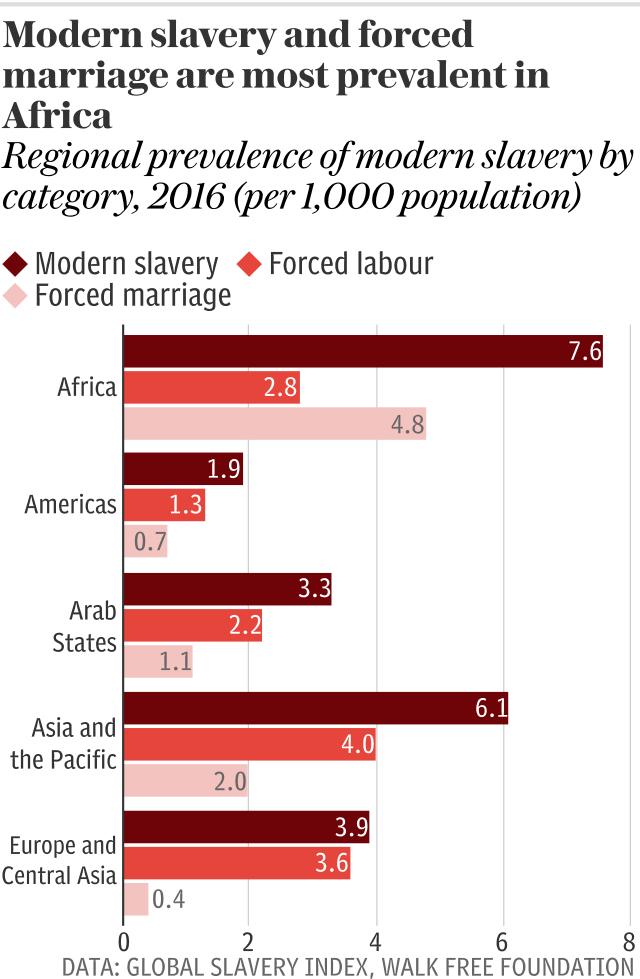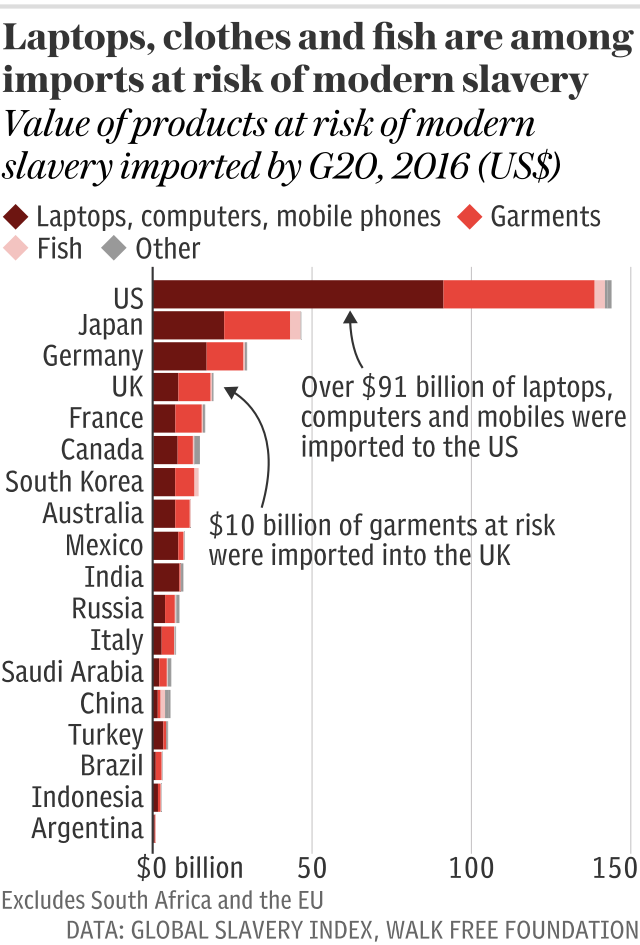Conflict and breakdown in law and order drive scourge of modern slavery

A new report has revealed the number of people around the world subject to trafficking and exploitation as modern-day slaves.
Modern slavery, described by UK prime minister Theresa May as “cruel exploitation”, encompasses both forced labour and forced marriage as well as human trafficking both within and between countries, debt bondage and the sale and exploitation of children.
The Global Slavery Index, a biennial survey of the international trade of people and goods that are reliant on the slave trade, reveals that 40 million people around the world are being held as modern-day slaves. The majority are in forced labour - 24.9 million - with 15.4 million held in forced marriage. And 70 per cent of all those living as slaves are women and girls.
The report says that the figures are likely to be an underestimate because of the lack of data from regions such as the Arab States and on practices such as the kidnap of children by armed groups and the number of people held for organ trafficking.

The index highlights two drivers for modern-day slavery: repressive regimes where people work to prop up their governments and countries in conflict where the rule of law has completely broken down.
The country with the largest number of modern-day slaves is North Korea, where just over one in 10 people in the country are forced to work for the state. Here, there are a staggering 2.6 million victims of modern slavery out of a population of just over 25 million, the report estimates.
The countries with the highest prevalence of modern slaves after North Korea are Eritrea, Burundi, Central African Republic, Afghanistan, Mauritania, South Sudan, Pakistan, Cambodia and Iran.
The report says that most of these countries are marked by conflict, with breakdowns in rule of law, displacement and a lack of security.
Eritrea is a repressive regime that “abuses its conscription system to hold its citizens in forced labour for decades”. Here, nearly one in 10 people are victims of modern slavery - there are an estimated 450,000 people held as slaves out of a population of 4.8 million.
Africa is the region with the largest proportion of people working or married against their will - 7.6 people for every 1,000, compared to 6.1 in Asia and the Pacific, 3.9 in Europe and Central Asia, 3.3 in the Arab States and 1.9 in the Americas.
In Africa, modern-day slaves are more likely to be in a forced marriage than forced to work against their will - 4.8 per 1,000 compared to 2.8 per 1000. Whereas in Asia and the Pacific region modern slaves are more likely to be held captive through work - 4.0 per 1,000 compared to 2.0 per 1,000.

The UK has 2.1 slaves for every 1,000 people - around 136,000 in total. This figure is at odds with the most recent Home Office data which put the number at between 10,000 and 13,000. However, it is similar to the rate in other comparable European countries - the rate in Germany, Belgium and France is 2.0 for every 1,000 people.
The report says that the number of modern slaves in high income countries is greater than previously understood, including in the UK, the United States, Australia, France, Germany and the Netherlands.
These countries - particularly the UK, Netherlands and the US - are doing the most to tackle slavery at home, says the report, through initiatives such as the UK's Modern Slavery Act.
But the discrepancy in the figures shows that even in countries with tough anti-slavery laws vulnerable people fall through the gaps.
“These gaps, which are being actively exploited by criminals, need urgent attention from governments,” says the report.
Irregular migrants, the homeless, workers in the gig economy and certain minorities are at risk of slavery in high-income countries, warns the report.
Andrew Forrest, founder of the Walk Free Foundation, which puts together the index, said the numbers in the UK had increased not because of "inaction but because of greater measurement".
Countries have stepped up their efforts to tackle the problem, since the last report which came out in 2016. In 2018, 36 countries were taking steps to address the problem compared to just four in 2016.
However, often they are doing the bare minimum and the report is particularly scathing of Qatar, Singapore, Kuwait, Brunei and Hong Kong which "are doing very little to respond despite their wealth and resources".
But while the citizens of the richest countries are at a low risk of being victims of modern slavery they are helping to perpetuate the practice through the purchase of products that are manufactured and processed by modern slaves.

The report estimates that the G20 countries are importing $354 billion worth of at-risk products annually. The top five products most likely to be traded via slavery are computers and mobile phones (worth $200.1 billion a year); clothing (£127.7bn); fish ($12.7billion); cocoa ($3.6bn) and sugarcane ($2.1bn).
Mr Forrest, founder of the Walk Free Foundation, said consumers had an "absolutely massive" role to play in combating slavery.
"I cannot overstate the role of consumers in highlighting the issue. Consumers have huge power and it's up to us to exercise that power to ensure the products we consume or wear aren't made at the hand of forced labour," he said.
He added that Apple had taken steps to stamp out the use of forced labour in its Chinese factories and supply chain since this issue was highlighted some years ago.
"Apple is very sensitive about using forced labour in its supply chain - they care because consumers have been asking the questions," he said.
Protect yourself and your family by learning more about Global Health Security

 Yahoo News
Yahoo News 
